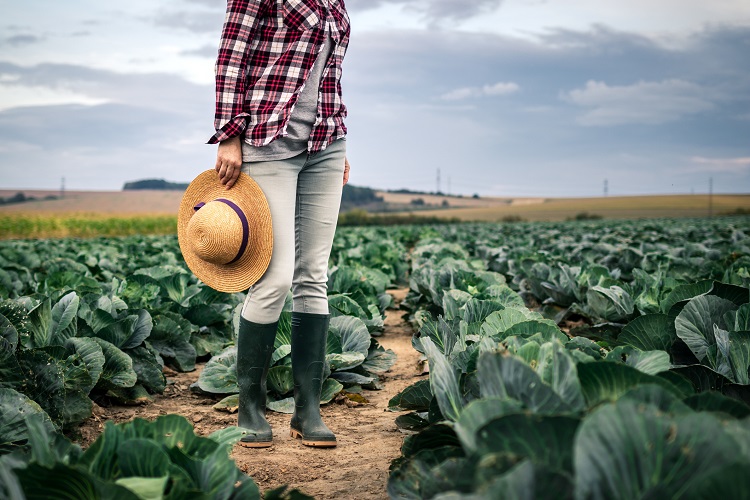Organic farming is believed to play a crucial role in moving towards a more sustainable food system.
According to the European Commission, organic farming provides higher income for farmers and benefits smaller family farms.
Organic farms are also perceived as more resilient and are known to foster greater biodiversity. Additionally, their animals enjoy higher animal welfare than their conventional farm counterparts.
Given these benefits, the European Commission wants to increase organic production across the block. Specifically, the Commission has set a goal of achieving at least 25% of farmland with organic farming by 2030.
With only 8.5% of farmland currently under organic farming, both supply and demand need a boost, MEPs suggest.
‘Supply and demand must go hand in hand’
“To reach the proposed 25%, we need to promote organic agriculture and its products thoroughly”, German MEP Christine Schneider said at a recent European Food Forum (EFF) event.
“It is market demand that determines the fate of our agricultural landscape. If there is no demand for [organically] grown produce, organic farming will not be the answer. ”

The current demand for organic products varies significantly across the EU 27. According to 2019 figures, Germany has the largest market (€ 12 billion) for organic food, followed by France (€ 11.3 billion), Italy (€ 3.6 billion), Sweden (€ 2.1 billion)) and Spain (€ 2 billion).
Denmark has the highest organic retail share with 12.1%, followed by Sweden, Austria and Luxembourg. Denmark also has the highest average per capita spending (€ 344), while the EU average stands at € 84.
The EU has the second largest single market (€ 38.8 billion) for organic products, behind the United States (€ 44.7 billion) and ahead of China (€ 8.5 billion).
When it comes to organic farmland, Austria leads. However, it has only achieved this position by securing the corresponding demand, explained Austrian MEP Simone Schmiedtbauer at the EFF event.
“In Austria, 26% of agricultural land is cultivated organically. We are already meeting the organic goals of farm-to-table strategies and biodiversity today. But this achievement didn’t happen overnight, it happened over decades.
“And it only works because we export some of our organic produced products,” He said, explaining that Austria’s national demand is not enough to “make organic farming profitable” for its farmers.
For Schmiedtbauer, therefore, the Commission’s 25% target is a “firm position”. There will be no increase in organic production without corresponding organic demand, he told delegates.
“If we insist on a 300% increase in organic land, from a European average of around 8% to 25% by 2030, it can only happen if supply and demand grow hand in hand.”
Encourage consumer acceptance
If Europe “forces a massive increase” in organic agriculture, without fostering “acceptable growth” in the sales market, Schmiedtbauer fears organic prices “collapse”. “In the end, this would be useless for farmers, not for the climate, not for our environmental protection efforts.”
The Austrian MEP suggested that responsibility must be balanced across the value chain.
“On the ‘farm’ side, we already find clear goals and efforts as to how farmers should contribute to the overall goal of climate neutrality and, among them, the organic goal.
“On the ‘fork’ side, however, we find fewer efforts and targets, especially numerical targets. However, both sides are strictly connected and are of equal importance. ”
For Schmiedtbauer, there is a “great responsibility” throughout the food chain, but “especially on the consumer side”.
“Let’s not forget that consumers dictate the food chain. At the end of the day, farmers produce what consumers buy, and if it is organic, then we happily produce organic. “
According to Schmiedtbauer, the Commission “now” understands the important role that demand plays in achieving greater organic coverage, as evidenced by its recently published Organic Action Plan.
The plan details how you hope to achieve your goal by stimulating production and processing; strengthen environmental sustainability; and driving consumer demand.
Regarding the latter, the Commission plans to increase the consumption of organic products and strengthen consumer confidence by taking actions to promote organic farming and the EU logo; promote organic canteens and increase the use of green public procurement; reinforce the organic school schemes; prevent food fraud; improve traceability; and facilitate the contribution of the private sector.
Schmiedtbauer welcomes the plan. “The demand side is finally taken into account in the Organic Action Plan”, He told delegates, suggesting that the Commission has taken a 180 degree turn from its farm-to-fork and biodiversity strategies, “Which basically says [increase] organic production and everything will be [be] very well “.

The Organic Action Plan approach was equally well received by IFOAM Organics Europe. “It is very important to have a push and pull approach”, IFOAM President Jan Plagge explained at the event.
This means integrating the entire food value chain, from consumers to retailers to food processors, in this transition, he explained. “For every conventional farm that goes organic, we need processors, retailers and consumers to convert their consumption habits.”
.

